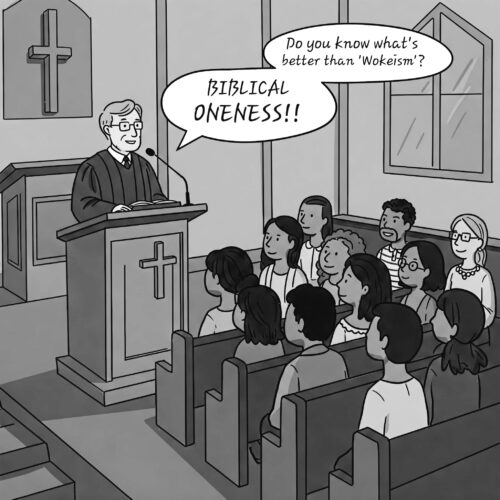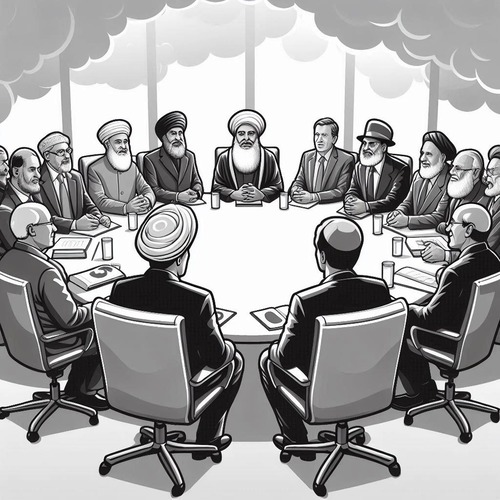What the ‘Woke’ Church Gets Wrong: A Call to Gospel-Centred Faithfulness
What the ‘Woke’ Church Gets Wrong: In recent years, a significant shift has occurred within many evangelical churches as they embrace what has come to be known as “woke” Christianity or progressive theology. While these movements often arise from genuine concern for justice and compassion, they present serious theological challenges that demand careful examination from a biblical perspective. This article seeks to analyse these challenges while maintaining fidelity to Scripture and the historical Reformed tradition.
Understanding the Current Landscape
The term “woke” originally emerged from African American civil rights discourse, signifying an awakening to social injustices. Within Christian contexts, it has evolved to represent a theological approach that often prioritises social action, intersectional identity, and cultural interpretation of Scripture above traditional orthodox understanding. While concerns for justice and mercy are biblical, the theological framework of “woke” Christianity often departs from crucial Biblical doctrinal foundations.
The Authority of Scripture: Where Progressive Christianity Falters
At the heart of Reformed theology lies the doctrine of Sola Scriptura—Scripture alone is our ultimate authority. Progressive Christianity often subjects Biblical interpretation to contemporary cultural narratives, effectively elevating human experience above divine revelation. This approach manifests in several problematic ways:
- Reinterpreting clear Biblical texts through modern ideological lenses
- Dismissing traditional Biblical interpretation as merely “cultural”
- Prioritising subjective experience over objective Biblical truth
When Scripture’s authority becomes secondary to cultural concerns, the church loses its foundational compass for truth and practice. As the Westminster Confession affirms, Scripture must remain our “supreme judge” in all religious controversies.
What the ‘Woke’ Church Gets Wrong: The Eclipse of Divine Sovereignty
Perhaps most concerning in progressive Christianity’s departure from biblical authority is its fundamentally man-centred worldview that sidelines God’s sovereignty. It assumes that human activism alone can bring about ultimate justice and reconciliation.
The Bible asserts God is sovereign over all creation, including history and culture (Isaiah 46:9-10). It sees God as the sovereign author of history working all things according to His purpose (Ephesians 1:11). Our confidence in God’s providence frees us from relying on flawed human systems and empowers us to trust in God’s redemptive plan.
Sin and Salvation: A Critical Divergence
Perhaps the most significant departure of progressive Christianity from Scripture lies in its understanding of sin and salvation. The Reformed tradition, following Scripture, emphasises:
- The total depravity of human nature
- Individual moral responsibility before God
- The necessity of personal repentance and faith
- Christ’s substitutionary atonement as the only remedy for sin
In contrast, “woke” theology often:
- Emphasises systemic sin while minimising personal moral responsibility
- Replaces individual repentance with calls for social action
- Suggests salvation comes through dismantling oppressive systems rather than through Christ’s finished work
This shift fundamentally alters the gospel message, replacing the biblical narrative of fall and redemption with a secular narrative of oppression and liberation.
Gender Roles and Biblical Order: Maintaining Created Distinctions
Reformed complementarianism upholds the biblical teaching of equal worth but distinct roles between men and women. Progressive Christianity often challenges these distinctions, arguing that:
- Traditional gender roles perpetuate oppression
- Biblical teachings on gender were culturally conditioned
- Modern gender theory should inform our biblical interpretation
However, Scripture presents gender distinctions as part of God’s good creation order, not as cultural constructs to be discarded. The complementarian position maintains these distinctions reflect God’s wisdom and design for human flourishing.
The Church’s Mission: Gospel Proclamation vs. Social Transformation
The Reformed tradition has always recognised the church’s primary mission as the proclamation of the gospel and making disciples. While this includes implications for all of life, “woke” Christianity often inverts this priority, making social transformation the primary goal and the gospel secondary.
This inversion manifests in:
- Replacing evangelistic emphasis with social advocacy
- Prioritising political activism over spiritual formation
- Measuring church success by social impact rather than faithfulness to Scripture
Conclusion: Standing Firm in Gospel Truth
While the concerns raised by progressive Christianity often reflect genuine issues requiring attention, its proposed solutions fundamentally depart from Reformed orthodoxy and biblical truth. The path forward requires:
- Maintaining firm commitment to biblical authority
- Preserving the distinction between law and gospel
- Upholding the sufficiency of Christ’s work
- Proclaiming the true gospel as the ultimate solution to both personal and social ills
Let us resist the allure of “wokeness” and stand firm on the unchanging truth of God’s Word, proclaiming the gospel as the ultimate hope for a broken world.
What the ‘Woke’ Church Gets Wrong—Related FAQs
How are critical race theory and biblical anthropology incompatible as frameworks? Biblical anthropology recognises all of humanity as image-bearers of God who share a common ancestor in Adam and are equally fallen through his sin. While critical race theory defines people primarily by their racial identity and group power dynamics, Scripture teaches our primary identity is either “in Adam” or “in Christ.” This framework difference matters deeply because it affects how we understand both the fundamental problem (sin vs. systemic oppression) and its solution (redemption in Christ vs. dismantling of power structures).
- What are the critical distinctions between biblical justice and social justice? Biblical justice flows from God’s character and is defined by His unchanging moral law, focusing on both individual actions and systemic issues through the lens of divine standards. Social justice, by contrast, typically defines justice by equality of outcomes and group identity, often ignoring individual moral responsibility. While biblical justice was ultimately fulfilled in Christ’s perfect life and sacrificial death, social justice seeks fulfillment through human effort and institutional reform.
- How can churches approach issues of racial reconciliation without compromising doctrinal integrity? Churches can acknowledge historical and present sins while maintaining that true reconciliation comes through the gospel of Christ rather than through secular ideological frameworks. Unity in Christ transcends but doesn’t erase ethnic distinctions, as demonstrated in Revelation’s vision of people from every tribe and tongue worshipping together. The path forward requires both repentance where needed and a firm commitment to gospel-centred rather than ideology-centred solutions.
In what ways does progressive Christianity misunderstand the relationship between law and gospel? Progressive Christianity often conflates law and gospel by turning social action into a means of salvation or acceptance before God. This approach effectively creates a new law-based system where social advocacy becomes a work through which one achieves righteousness. The biblical distinction maintains that while the law shows us God’s character and convicts us of sin, only the gospel provides the remedy through Christ’s finished work.
- How can church leadership address politically charged issues without becoming partisan? Church leaders can address moral and social issues by consistently applying biblical principles rather than adopting partisan political positions. The focus should remain on scriptural truth rather than political ideology, recognising that God’s Word often challenges all human political frameworks. When addressing controversial issues, leaders can demonstrate how biblical principles transcend partisan divisions while maintaining clear biblical teaching.
- What’s wrong with incorporating secular psychological concepts into Christian counselling and discipleship? While general revelation can provide helpful insights, elevating secular psychological frameworks above or alongside Scripture undermines the sufficiency and authority of God’s Word for addressing human nature and problems. Secular psychology often begins with fundamentally different assumptions about human nature, the source of human problems, and their solutions. Biblical counselling must maintain Scripture provides the foundational framework for understanding and addressing human spiritual, emotional, and relational needs.
How does progressive Christianity mishandle the relationship between individual and corporate responsibility? Progressive Christianity tends to overemphasise corporate responsibility while minimising individual moral accountability before God. While Scripture clearly addresses both individual and corporate sin, it consistently maintains that each person will give an account before God for their own actions. The biblical balance recognizes corporate responsibility without dissolving individual moral agency and the need for personal repentance and faith.
What the ‘Woke’ Church Gets Wrong—Our Related Posts
Editor's Pick

Self-Authentication: Why Scripture Doesn’t Need External Validation
"How can the Bible prove itself? Isn't that circular reasoning?" This objection echoes through university classrooms, coffee shop discussions, and [...]

Do Christians Need Holy Shrines? Why the Reformed Answer Is No
Walk into a medieval cathedral and you'll encounter ornate shrines, gilded reliquaries, and designated "holy places" where pilgrims gather to [...]

I Want To Believe, But Can’t: What Do I Do?
"I want to believe in God. I really do. But I just can't seem to make it happen. I've tried [...]

BC 1446 or 1250: When Did the Exodus Really Happen?
WHY REFORMED SCHOLARS SUPPORT THE EARLY DATE Many a critic makes the claim: “Archaeology has disproven the biblical account [...]

Does God Know the Future? All of It, Perfectly?
Think about this: our prayers tell on us. Every time we ask God for something, we’re confessing—often without realising it—what [...]

Can Christian Couples Choose Permanent Birth Control?
Consider Sarah, whose fourth pregnancy nearly killed her due to severe pre-eclampsia, leaving her hospitalised for months. Or David and [...]

Bone of My Bones: Why Eve Was Created From Adam’s Body
"This at last is bone of my bones and flesh of my flesh!" Adam's joyful exclamation upon first seeing Eve [...]

Is Calvinism Fatalism in Christian Disguise? Think Again
We hear the taunt every now and then: "Calvinism is just fatalism dressed up in Christian jargon." Critics argue Reformed [...]

Can Churches Conduct Same-Sex Weddings?
In an era of rapid cultural change, churches across America face mounting pressure to redefine their understanding of marriage. As [...]

Gender Reassignment: Can Christian Doctors Perform These Surgeries?
In the quiet of a clinic, a Christian physician faces a challenging ethical question. A patient sits across the desk, [...]
SUPPORT US:
Feel the Holy Spirit's gentle nudge to partner with us?
Donate Online:
Account Name: TRUTHS TO DIE FOR FOUNDATION
Account Number: 10243565459
Bank IFSC: IDFB0043391
Bank Name: IDFC FIRST BANK






